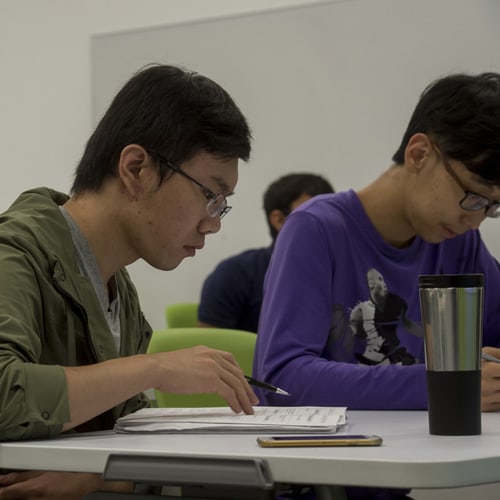Qualifying Exams (Joint Program Examinations)
All Ph.D. students must pass two Joint Program Examinations. One exam covers Mathematical Analysis (MA 640 and MA 641). The other exam covers Linear Algebra and Numerical Linear Algebra (MA 631 and MA 660). Each exam is three and a half hours long.
 Master's degree students who are not planning on writing a thesis and who have passed the Joint Program Exam will not be required to take the final oral examination for the master's degree.
Master's degree students who are not planning on writing a thesis and who have passed the Joint Program Exam will not be required to take the final oral examination for the master's degree.
Joint Program Examination Rules, effective September 2023 (PDF)
Scheduling an Exam
The examinations in Mathematical Analysis and Linear Algebra are given during two periods each year (one in May and one in August). During each period a student may take one or both of the exams, subject to the following restrictions:
- each exam may be attempted no more than twice, and
- students may participate in exams during no more than three periods.
Any student considering taking an examination must meet as soon as possible with the Graduate Student Advisor, Dr. Roman Shterenberg, in University Hall 4035 for scheduling information, advice, and information.
Spring 2024 Schedule
- Mathematical Analysis: Monday, May 6, 8:30 a.m. -12:00 p.m.
- Linear Algebra: Wednesday, May 8, 8:30 a.m. - 12:00 p.m.
Fall 2024 Schedule
- Mathematical Analysis: Monday, August 12, 8:30 a.m. -12:00 p.m.
- Linear Algebra: Wednesday, August 14, 8:30 a.m. - 12:00 p.m.
Exam Topics
-
Mathematical Analysis
Topics for Mathematical Analysis Joint Program Exam, Effective September 2023
- sup and inf for subsets of R, lim sup, lim inf for real sequences, Bolzano- Weierstrass theorem, Cauchy sequences.
- Continuous functions - min-max, intermediate value theorem, uniform conti-nuity, monotone functions.
- Derivative - mean value theorem, Taylor’s theorem for real functions on an interval.
- Riemann integration for functions on an interval. Improper integrals. Integrals depending on parameters.
- Sequences of functions - pointwise and uniform convergence, interchange of limits.
- Series of functions - M -test, differentiation/integration, real analytic functions.
- Metric spaces - open and closed sets, completeness and compactness, Cauchy sequences, continuous functions between metric spaces, uniform continuity, Heine-Borel and related theorems, contraction mapping theorem, Arzela-Ascoli theorem.
-
Linear Algebra
Linear Algebra
- Vector spaces over a field, subspaces, quotient spaces, complementary spaces
- bases as maximal linearly independent subsets, finite dimensional vector spaces
- linear transformations, null spaces, ranges, invariant subspaces, vector space isomorphisms
- matrix of a linear transformation, rank and nullity of linear transformations and matrices
- change of basis, equivalence and similarity of matrices, dual spaces and bases
- diagonalization of linear operators and matrices
- Cayley-Hamilton theorem and minimal polynomials, Jordan canonical form
- real and complex normed and inner product spaces, Cauchy-Schwarz and triangle inequalities
- orthogonal complements, orthogonal sets, Fourier coefficients and the Bessel inequality
- adjoint of a linear operator, positive definite operators and matrices
- unitary diagonalization of normal operators and matrices, orthogonal diagonalization of real symmetric matrices
- bilinear and quadratic forms over a field
Numerical Linear Algebra
- Triangular matrices and systems, Gaussian elimination, triangular decomposition;
- the solution of linear systems, the effects of rounding error;
- norms and limits, matrix norms;
- inverses of perturbed matrices, the accuracy of solutions of linear systems;
- iterative refinement of approximate solutions of linear systems;
- orthogonality, the linear least squares problem, orthogonal triangularization, the iterative refinement of least squares solutions;
- the space Cn, Hermitian matrices, the singular value decomposition, condition;
- eigenvalues and eigenvectors, reduction of matrices by similarity transformations, the sensitivity of eigenvalues and eigenvectors;
- eduction to Hessenberg and tridiagonal forms;
- the power and inverse power methods, the explicitly shifted QR algorithm, the implicitly shifted QR algorithm;
- computing singular values and vectors, the generalized eigenvalue problem A−λB.